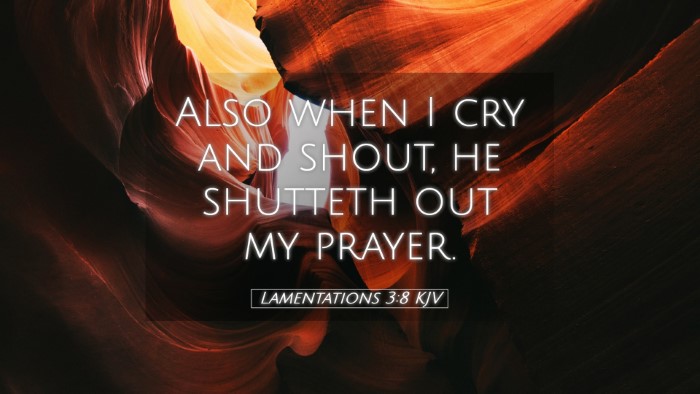Lamentations 3:8 Commentary
Lamentations 3:8 reads: "Even when I cry out and plead, he shuts out my prayer." This verse encapsulates the profound sense of despair and alienation experienced by the author, traditionally attributed to the prophet Jeremiah, amidst the suffering of the people of Jerusalem after the destruction of the city. The weight of this verse can be explored deeply through the insights of classic commentaries.
Contextual Background
The book of Lamentations is a poignant reflection on the calamities faced by the people of Israel. Set against the backdrop of their exile and loss, this particular verse resonates with themes of unresponsiveness from God in times of distress. It places the reader in the heart of a struggle where prayer, often seen as a lifeline to God, feels futile.
Insights from Matthew Henry
Adam Clarke notes that this verse demonstrates the anguish felt when the soul cries out to God yet perceives a wall of silence in return. Henry emphasizes the painful paradox of being a believer who experiences the feeling of being forsaken by God:
- The Isolation of Prayer: According to Henry, the lament reflects a common experience in which the faithful cry out in distress, yet their prayers seem to ascend to a closed heaven.
- The Reality of Suffering: He elucidates that this cry is not merely a complaint but rather a profound acknowledgment of Israel’s state, illustrating the genuine agony of God's people who feel abandoned in their plight.
- The Purpose of Distress: Henry suggests that such periods of spiritual dryness serve as an invitation to deeper faith. They challenge the believer to seek God more diligently, even in silence.
Albert Barnes' Perspective
Albert Barnes provides an analytical approach to understanding this verse. He recognizes the despair that accompanies unanswered prayers. Barnes zeroes in on several critical aspects:
- Human Perception vs. Divine Reality: Barnes argues that the feeling of being unheard is often tied to human perception. God’s delay in responding does not equate to His rejection or disinterest.
- Covenant Relationship: He reminds readers that Israel had a covenant relationship with God, which entails both blessings and chastening. This momentary silence could signify divine discipline rather than abandonment.
- The Meaning of Crying Out: Barnes also highlights that the act of crying out itself is a crucial element of faith, showing that it is not the loudness but the sincerity of communication with God that matters.
Insights from Adam Clarke
Adam Clarke brings a theological depth to this scripture, focusing on the personal dimensions of lament. His commentary includes:
- The Nature of Prayer: Clarke posits that prayer is a personal and communal act that can expose the depths of human sorrow. In feeling unheard, the believer's sense of isolation can lead to questioning God's presence.
- Reflections on Perseverance: Clarke sees the persistent crying out as essential to spiritual growth. He encourages believers to continue praying despite the silence, reinforcing that faith is often tested in trials.
- Theological Implications: He emphasizes the theological implications of God’s silence, arguing that understanding such moments is key to discerning God’s purposes in our lives.
Theological Themes
Drawing from the aforementioned insights, several critical theological themes can be extracted from Lamentations 3:8:
- Suffering and the Silence of God: The verse sharply captures the tension between suffering and the perceived absence of God. This paradox is a recurring theme in scripture and challenges believers to trust even when feelings contradict faith.
- The Necessity of Lament: Lament is a vital aspect of the biblical tradition. It validates the experience of pain and suffering, inviting individuals to express their struggles in God's presence. This can lead to transformation and deeper intimacy with God.
- The Call to Endurance: The spiritual discipline of persistence in prayer, even when answers seem absent, is underscored here. Such endurance is modeled by the author, highlighting the reality that patience and faith often walk hand in hand.
Application for Today
This verse continues to speak powerfully to pastors, students, theologians, and scholars today. It serves as a reminder that:
- God’s Presence in Silence: In the modern believer's life, there will inevitably be times when God seems silent. Recognizing that silence does not equate to absence is crucial for spiritual health.
- The Role of the Community: Sharing experiences of lament within a community creates a supportive environment where believers collectively seek God, fostering resilience and hope.
- The Importance of Honest Prayer: Encouraging authenticity in prayer helps believers navigate their spiritual journeys with integrity, ultimately drawing them closer to God’s heart.
Conclusion
Lamentations 3:8 reveals the depths of human anguish in prayer and the feelings of being shut out by God. The combined insights from Matthew Henry, Albert Barnes, and Adam Clarke illustrate how these experiences of silence are woven into the fabric of faith. Through understanding and embracing the themes of suffering, lament, and persistence, believers today can find hope even amidst their struggles, encouraging them to continue their prayers with honesty and a deepened sense of faith.


